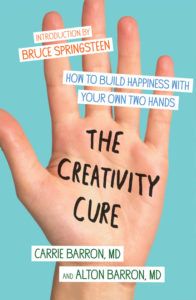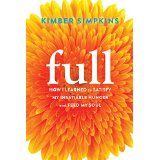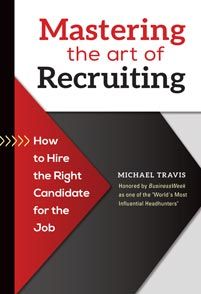 It’s always exciting to help a client come up with a great book title. I still remember the conversation where I suggested The Creativity Cure to Carrie Barron. The title came from listening to Carrie talk about the work she does with her clients, the problems they have, the promise, benefits and results they are seeking. I heard two things in listening to Carrie: a) Creativity was the method by which she helped people and b) the people she helped were depressed, anxious and unhappy. The Creativity Cure spoke to the audience and offered a solution to their problem–a potential cure, in fact.
It’s always exciting to help a client come up with a great book title. I still remember the conversation where I suggested The Creativity Cure to Carrie Barron. The title came from listening to Carrie talk about the work she does with her clients, the problems they have, the promise, benefits and results they are seeking. I heard two things in listening to Carrie: a) Creativity was the method by which she helped people and b) the people she helped were depressed, anxious and unhappy. The Creativity Cure spoke to the audience and offered a solution to their problem–a potential cure, in fact.
You can use these 5 simple questions to come up with a book title that resonates for your target audience and sells books!
1. WHO’S YOUR READER? A great book title always begins with understanding who your audience is. With Carrie, I pointed out that, from listening to her talk about her clients, her reading audience was probably similar, rather than people who saw themselves as creative, it was more broad: people who are depressed, anxious or unhappy. You can’t come up with a book title that sizzles unless you first know who your readers are.
2. WHAT’S THE PROBLEM? Are they burned out? Living paycheck to paycheck? Overwhelmed as a parent? Feeling blah? Sick? Adopted? Lonely? Single but wanting to be married? Or maybe they don’t exactly have a problem, but they have a goal or vision: perhaps they are seeking a spiritual or religious experience, they want to double their income or they want to adopt the perfect pet (these, too, can be stated as a problem–that they don’t quite know how to do these things, but the primary motivator is the vision or goal).

3. WHAT WORDS DO YOUR READERS USE? Today, I was on a call with a participant in my Bring Your Book to Life Program, which begins in two weeks. She shared an absolutely brilliant testimonial from one of her clients with me. He shared in detail the dramatic shifts that occurred in his coaching sessions with her. I told her to circle all the problems and all the benefits. Some of these words might be perfect for her title and some might be perfect for chapter titles, or even headings within the chapters. When you mirror your clients’ or readers’ words back to them, they resonate more deeply than if you use your own words. Plus your words an an author might be more feature-oriented. You might use jargon or words that people in your industry tend to overuse. In this case, the author was using a formerly powerful word but one that felt tired from recent overuse. As a result, the title didn’t sound fresh.
4. WHAT ARE YOUR READERS LOOKING FOR, IN THEIR WORDS? Once again, you want to get into your readers’ minds and use the words they use to describe the results and benefits they’re looking for. What’s the big vision or goal? Or what’s the new result they want? In the case of today’s phone call, we thought about the words that would really speak to what her readers are looking for. We looked at some of the overused words and consulted a trusty thesaurus for more exciting alternatives–and we found them. Use your readers’ words, for sure, but also be ready to find synonyms that will add energy or freshness if your readers’ words are a bit stale from overuse.
5. WHAT’S THE CONTEXT? If this is a business book, that needs to be clear from the title and/or subtitle. If it’s a parenting book, it can’t sound like a dating book or your readers will be confused. The title doesn’t always have to be clear if the subtitle explains it. Sometimes you can go for a playful title or a one word title that relies on the subtitle for clarity. That’s fine. One word titles can have impact and there is value to simplicity. Just ask Malcolm Gladwell!

BONUS: CAN YOU MAKE IT PLAYFUL? Not all titles need to be playful, but in our information-overloaded and entertainment-driven culture, a fun and playful title can make your book stand out and be more captivating.
When wondering how to come up with a book title for a nonfiction book, particularly self-help or how-to, you have several options:
- A catchy title that makes it very clear both who the book is for and what are the benefits, followed by a subtitle that gives more of a sense of the features (i.e. a 10 week program, a 10 step plan)
- A creative title that sounds fun or intriguing or playful and invites us to want to know more, followed by a subtitle that makes it clear who the book is for and at least one or more benefits.
- A super short title (perhaps only a word) that catches readers’ attention, followed by a subtitle that makes it clear who the book is for and at least one or more benefits.
- Some variation on the above.
Can you have a title without a subtitle? You can do anything you want. If the title says it all, you may not need a subtitle.
TITLE Fixes and Tips:
Sometimes my clients come up with two titles and no subtitle; that is, both titles sound a bit poetic or fun or intriguing, but neither fully explains the book. In this case, pick the catchier title and work on a subtitle that’s more specific and clear.
Test your title and subtitle on people in your target market (clients are ideal) and see what resonates the most for them. (Click to Tweet This) Feel free to come up with many titles (you can even use a focus group for this) and have your audience help you come up with titles! Or just get them talking about their problems, needs and desires and make note of the words they use. Can you use their words in the title?
Use a thesaurus to find alternatives that are shorter, more specific, fresher or just plain old sound better.
Have any questions about how to come up with a book title that sizzles? Ask as a comment and I will answer. Feel free to share your ideas about how to come up with a great book title, as well.

